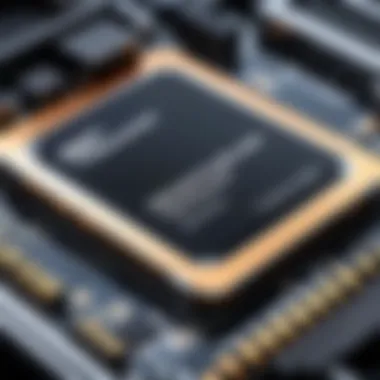The Ultimate Guide to Enhancing SSD Performance Through Effective Cleaning Practices


Product Overview
When delving into the realms of optimizing the performance of your SSD, it becomes imperative to grasp a detailed overview of the product in question. Understanding the brand information offers crucial insights into the manufacturer's reputation, product lineage, and commitment to quality. Moreover, delving into the key specifications of the SSD sheds light on its capacity, readwrite speeds, form factor, and any unique attributes that set it apart. Pricing considerations play a pivotal role in the decision-making process, weighing the features offered against the investment required.
Performance Comparison
Conducting benchmark tests is a cornerstone of evaluating the efficiency and speed of an SSD. By comparing these results with industry standards, one can glean a comprehensive understanding of how the SSD fares in real-world scenarios. Speed and efficiency comparisons against similar products help in identifying strengths and weaknesses. This data-driven approach ensures that consumers make informed decisions based on tangible performance metrics.
Features and Technology
Exploring the unique features of the SSD unveils its technological advancements and compatibility with other devices. Whether it boasts advanced encryption protocols, wear-leveling technologies, or innovative cooling mechanisms, these features contribute to the overall user experience. Understanding how the SSD integrates with different systems and devices provides valuable insights into its versatility, making it a suitable choice for a wide array of tech setups.
Pros and Cons
Scrutinizing the strengths of the SSD reveals the areas where it excels, such as exceptional readwrite speeds, high durability, or robust data protection measures. Conversely, acknowledging areas for improvement sheds light on potential drawbacks like compatibility issues, limited storage capacities, or user interface challenges. This balanced appraisal equips consumers with a nuanced perspective, aiding in decision-making processes.
Value for Money
When assessing the cost-effectiveness of the SSD, one must consider not only the initial investment but also the long-term benefits it offers. Comparing its price point with similar products in the market provides a holistic view of its value proposition. Evaluating factors like durability, performance longevity, and customer support services helps in determining whether the SSD delivers a compelling return on investment.
Introduction
Cleaning your SSD for optimal performance is a meticulous process that plays a crucial role in maintaining the efficiency and longevity of your solid-state drive. In this article, we will delve into the intricate details of SSD maintenance, emphasizing the significance of regular cleaning to ensure that your SSD operates at its best capacity over an extended period. Whether you are a tech enthusiast, a hardcore gamer, or an IT professional, understanding the nuances of cleaning your SSD is essential for maximizing its functionality.
Understanding the Significance of SSD Maintenance
Why Regular Cleaning is Essential
Regular cleaning is a fundamental aspect of SSD maintenance that directly impacts the overall performance and lifespan of your drive. The consistent removal of unwanted data and temporary files helps in optimizing the storage space and enhancing operational speed. By performing regular cleaning, you can prevent the accumulation of clutter that can potentially slow down your SSD's functionality, ensuring smooth operation and efficient data processing.


Effects of Neglecting SSD Maintenance
Neglecting SSD maintenance can lead to various detrimental effects on the performance and lifespan of your drive. Failure to clean your SSD regularly can result in decreased read and write speeds, increased risk of data corruption, and overall system slowdown. Additionally, neglecting maintenance can shorten the lifespan of your SSD, ultimately leading to premature drive failure and potential data loss. It is imperative to understand the consequences of neglecting SSD maintenance to prevent the deterioration of your drive's performance.
Overview of SSD Cleaning Process
Tools Required for Cleaning
When cleaning your SSD, it is essential to have the appropriate tools at your disposal. Soft, lint-free cloths, compressed air cans, and isopropyl alcohol are commonly used tools for effectively cleaning the external and internal surfaces of your SSD. These tools aid in removing dust, debris, and other contaminants that can hinder the optimal functioning of your drive, promoting sustained performance and longevity.
Precautions to Take Before Cleaning Your SSD
Prior to initiating the cleaning process, it is crucial to take certain precautions to safeguard your SSD from potential damage. Disconnecting the SSD from the power source and ensuring it is properly grounded can prevent electrical damage during the cleaning process. Moreover, handling the SSD with care, avoiding static electricity, and using gentle cleaning agents are essential precautions to maintain the integrity of your drive while cleaning. Implementing these precautions will help in preserving the functionality and durability of your SSD throughout the cleaning process.
Preparation for Cleaning
When it comes to cleaning your Solid State Drive (SSD) for optimal performance, preparation plays a critical role in ensuring success. Preparing adequately before delving into the cleaning process can help prevent potential data loss and system damage, ultimately prolonging the lifespan of your SSD. One of the primary elements of preparation is backing up important data, which serves as a failsafe in case of unexpected issues during cleaning. By taking the time to back up your crucial files and documents, you create a safety net that offers peace of mind while carrying out maintenance tasks on your SSD. Additionally, gathering the necessary cleaning supplies is essential to execute the cleaning process with efficiency and precision. Having the right tools at hand can streamline the cleaning procedure and minimize the risk of errors. Therefore, emphasizing the significance of preparation for cleaning in this guide is imperative to help readers approach SSD maintenance methodically and confidently.
Backing Up Important Data
Creating a Data Backup Strategy
Creating a data backup strategy is paramount in the realm of SSD maintenance, especially when preparing to clean your drive thoroughly. This specific aspect involves devising a plan to systematically safeguard your data before undertaking any cleaning activities on the SSD. The key characteristic of creating a data backup strategy lies in its proactive approach towards data protection, ensuring that no valuable information is lost during the cleaning process. This strategy is considered a popular choice for this article because it promotes data integrity and minimizes the risk of irrevocable data loss, aligning perfectly with the objective of maintaining optimal SSD performance. Moreover, the unique feature of a data backup strategy is its versatility, allowing users to customize backup solutions based on their specific needs and preferences. The advantages of implementing a data backup strategy in this context include mitigating the impact of potential mishaps during cleaning, preserving important files, and facilitating a seamless restoration process. Overall, creating a data backup strategy is a fundamental step in preparing for cleaning your SSD, underlining its significance in ensuring a smooth and secure maintenance procedure.
Gathering Necessary Cleaning Supplies
For effective SSD cleaning, acquiring essential items for the process is crucial to achieve satisfactory results and prevent damage to the drive. The specific aspect of gathering necessary cleaning supplies entails assembling the right tools and materials essential for thorough cleaning. The key characteristic of these essential items is their functionality in facilitating a safe and efficient cleaning operation for your SSD. They are considered a beneficial choice for this article due to their direct contribution to the overall goal of optimizing SSD performance through proper maintenance. One notable unique feature of essential cleaning supplies is their compatibility with SSD components, ensuring that the cleaning process is gentle yet effective in removing dirt and debris. As with any tool, there are advantages and disadvantages to consider when utilizing essential items for cleaning your SSD. While these supplies enhance the lifespan and functionality of your drive by promoting cleanliness, some may pose risks if not used correctly. Understanding how each essential item contributes to the cleaning process is essential in maximizing their benefits while minimizing potential drawbacks. By emphasizing the importance of gathering necessary cleaning supplies, this guide aims to equip readers with the essential resources needed to care for their SSD meticulously and prolong its efficiency.
Step-by-Step Cleaning Guide
Cleaning your SSD step-by-step is paramount for maintaining optimal performance and extending its lifespan. The detailed process outlined in this section will guide you through each crucial stage of cleaning your SSD effectively.


Disconnecting and Removing the SSD
Shutting Down Your System Properly
Shutting down your system properly is a fundamental aspect of the cleaning process. By ensuring the system is shut down correctly before removing the SSD, you reduce the risk of data corruption and hardware damage. This step is critical in preventing any potential errors that may occur during the cleaning procedure, safeguarding both your data and SSD.
Physically Removing the SSD from Your Computer
Physically removing the SSD from your computer necessitates careful handling to avoid static discharge and physical damage. By following proper procedures, such as disconnecting cables and using an anti-static mat, you can prevent any harm to the SSD or other components. This approach ensures a safe and efficient removal process, setting the stage for a successful cleaning operation.
Cleaning the External Surface
Using Gentle Cleaning Agents
Using gentle cleaning agents is essential to prevent damage to the external surface of the SSD. Gentle solutions like isopropyl alcohol and microfiber cloths effectively remove dirt and dust without causing harm to the SSD's casing. This method ensures a thorough cleaning without risking scratches or other surface imperfections.
Avoiding Harsh Chemicals
Avoiding harsh chemicals is crucial when cleaning the external surface of your SSD. Harsh chemicals can degrade the plastic or metal casing, leading to discoloration or weakening of the material. By opting for milder cleaning agents, you protect the external integrity of the SSD, preserving its appearance and structural strength.
Internal Cleaning of the SSD
Proper Use of Compressed Air
Proper use of compressed air is indispensable for clearing out dust and debris from inside the SSD. By following specific guidelines on air pressure and distance, you can effectively remove contaminants that may hinder the SSD's performance. This method ensures a clean internal environment, promoting efficient operation and longevity of the SSD.
Cleaning Connector Pins
Cleaning connector pins is a delicate task that requires precision and care. Using a soft, lint-free cloth or a specialized connector cleaning tool, you can gently remove any dirt or residue from the pins. This meticulous cleaning process maintains optimal connectivity and signal transmission, reducing the risk of poor contact or data transfer issues.
Reassembling and Reconnecting the SSD


Ensuring Proper Placement
Ensuring proper placement of the SSD is crucial for its stable operation within the system. By aligning the SSD correctly in the designated slot and securing it firmly, you prevent any movement or dislodging that could impact performance. This careful placement guarantees a stable connection and optimal functionality of the SSD.
Securing the SSD in Your System
Securing the SSD in your system involves fastening screws or brackets to keep the SSD firmly in place. This secure mounting ensures that the SSD remains stable during operation, reducing vibration-induced wear and potential data loss. By securely fastening the SSD, you maintain its position and structural integrity within the system.
Post-Cleaning Tips and Maintenance
Post-cleaning tips and maintenance play a crucial role in ensuring the longevity and optimal performance of your SSD. After completing the cleaning process, it is imperative to test your SSD to guarantee that it is functioning correctly. Running diagnostic checks on your SSD is an essential step as it helps in identifying any potential issues or errors that may have arisen during cleaning. By monitoring the performance of your SSD post-cleaning, you can ensure that it is operating at its peak efficiency.
Testing Your SSD After Cleaning
Running Diagnostic Checks
Running diagnostic checks involves utilizing specialized software to examine the various components and functionality of your SSD. This process allows you to detect any errors, bad sectors, or performance issues that may impact the overall operation of your SSD. Running diagnostic checks is beneficial as it provides you with a detailed report on the health status of your SSD, enabling you to take necessary corrective measures promptly. One advantage of running diagnostic checks is its ability to offer detailed insights into the condition of your SSD, helping you address potential problems before they escalate.
Monitoring Performance
Monitoring the performance of your SSD post-cleaning involves observing its speed, responsiveness, and overall functionality. By keeping a close eye on how your SSD is operating, you can detect any anomalies or deviations from its normal behavior. The key characteristic of monitoring performance is to identify any performance degradation or potential issues that may have emerged after cleaning. One beneficial aspect of monitoring performance is its proactive approach to ensuring the continuous optimal operation of your SSD, thereby prolonging its lifespan.
Regular Maintenance Practices
Scheduling Periodic Cleanings
Scheduling periodic cleanings is essential for maintaining the efficiency and performance of your SSD in the long run. By establishing a regular cleaning schedule, you can prevent the accumulation of dust, debris, or other contaminants that may hinder the optimal functioning of your SSD. The key characteristic of scheduling periodic cleanings is its ability to prevent potential hardware failures or malfunctions by keeping your SSD clean and free from obstructions. One advantage of scheduling periodic cleanings is its cost-effective nature, as it helps in avoiding expensive repairs or replacements due to neglect.
Avoiding Common Mistakes
Avoiding common mistakes in SSD maintenance is crucial for optimizing its performance and durability. Common mistakes such as using abrasive cleaning agents or improper handling can lead to damage to your SSD. By being mindful of these mistakes and following recommended care practices, you can maximize the lifespan of your SSD. The unique feature of avoiding common mistakes lies in its emphasis on gentle cleaning methods and proper handling procedures, safeguarding your SSD from unnecessary wear and tear. An advantage of avoiding common mistakes is the preservation of your SSD's integrity, ensuring smooth operation and longevity.
Conclusion
In this comprehensive guide on cleaning your SSD for optimal performance, the significance of proper maintenance cannot be understated. By diligently following a routine cleaning regimen, users can significantly prolong the lifespan and efficiency of their SSDs. The fruits of regular maintenance are manifold, ranging from improved read and write speeds to enhanced overall system performance. Additionally, a well-maintained SSD is less prone to errors and data corruption, providing peace of mind to users, especially those dealing with important data and sensitive information.
Moreover, understanding the nuances of SSD cleaning not only ensures that the hardware functions optimally but also minimizes the risk of unexpected failures. Regular maintenance practices, such as cleaning connector pins and monitoring SSD performance, can preemptively identify any underlying issues, allowing users to address them before they escalate into major problems. This proactive approach not only saves time and effort but can also potentially save users from costly data recovery processes or even SSD replacements.







